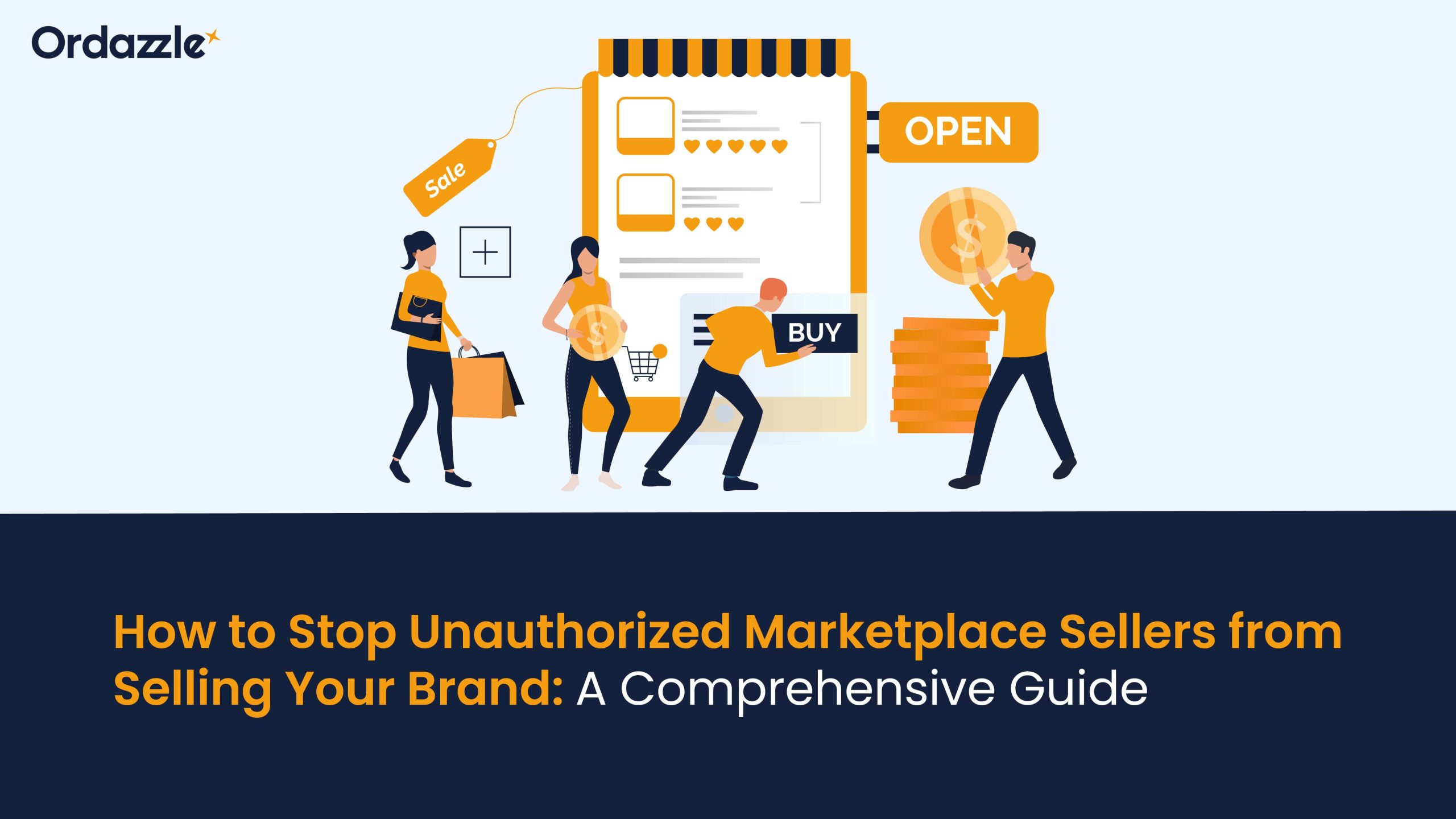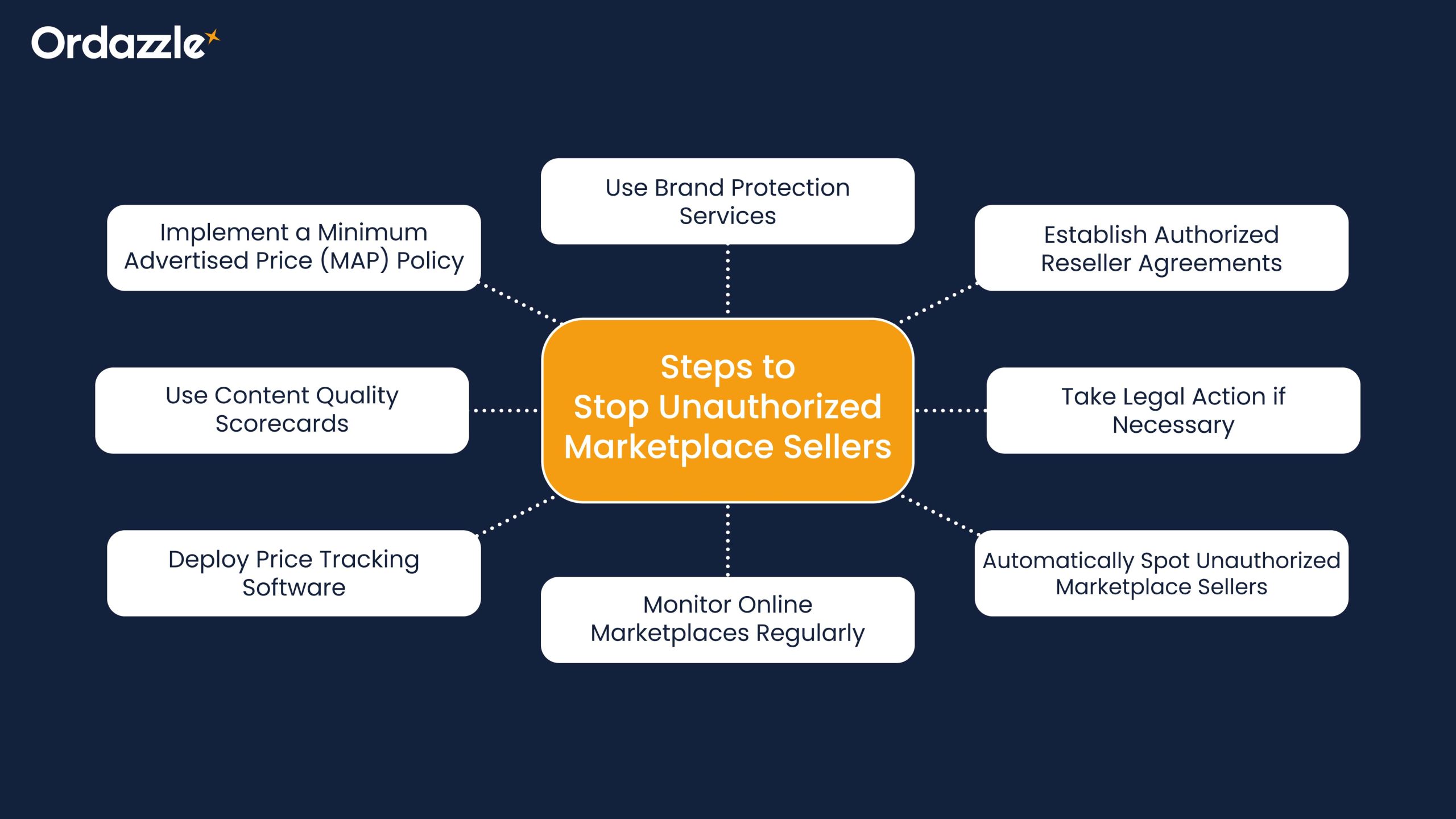
How to Stop Unauthorized Marketplace Sellers from Selling Your Brand: A Comprehensive Guide
2024 marks a pivotal year for global e-Commerce, with online retail expected to account for a significant portion of total global retail sales, reaching an estimated 21.2%. As online shopping continues its rapid expansion, so does the risk posed by unauthorized marketplace sellers looking to exploit the market.
These sellers not only pose a threat to a brand’s reputation but also jeopardize its sales and customer loyalty.
In this comprehensive guide, we’ll explore effective strategies to stop unauthorized sellers and safeguard your brand’s integrity.
What are marketplace sellers?
Marketplace sellers are any third-party individuals or entities who have no official relationship with your company whatsoever but still create product listings on marketplaces, selling your brand’s products. These sellers can source products from unauthorized channels or engage in counterfeiting, grey market selling, or parallel importing. They do not only sell products without your permission but often undermine recommended sales prices, publish untrue product information, and damage your brand’s identity and value.
How Can Unauthorized Marketplace Sellers Hurt Your Brand?
Unauthorized sellers can have far-reaching negative effects on your brand’s reputation, sales, marketplace management, and overall business success. Here’s how their activities can harm your brand:
- Product Quality Concerns: Unauthorized sellers may distribute counterfeit or substandard products, damaging customer trust in your brand’s quality and authenticity.
- Pricing and Value Perception: By undercutting official pricing, unauthorized sellers create confusion and diminish the perceived value of your brand, especially among customers seeking premium products.
- Customer Experience Disruption: The presence of unauthorized sellers can confuse customers about product authenticity, warranty, and support, leading to dissatisfaction and negative customer experience
- Channel Confusion: Customers may struggle to distinguish legitimate products from unauthorized ones, resulting in a loss of trust and loyalty.
- Strained Relationships: Unauthorized marketplace sellers can alienate authorized distributors and retailers, disrupting established networks and partnerships.
- Legal and Intellectual Property Issues: Unauthorized sellers may infringe upon your intellectual property rights, leading to costly legal battles.
- Price Wars: Unauthorized sellers initiate price wars by offering discounts well below theirr recommended prices, resulting in lower margins and profits for authorized sellers.
- Lost Buy Box & Search Rankings: Unauthorized sellers can manipulate search results and steal buy-box placements, resulting in lost sales opportunities for you and your authorized resellers.
Marketplace Saturation: The influx of unauthorized sellers can saturate the market with your products, making it difficult for authorized sellers to differentiate themselves. This emphasizes the need for an effective e-Commerce management system to regulate distribution channels.
Steps to Stop Unauthorized Marketplace Sellers
 1. Implement a Minimum Advertised Price (MAP) Policy
1. Implement a Minimum Advertised Price (MAP) Policy
Establishing a Minimum Advertised Price (MAP) policy sets clear guidelines for advertising your products. By diligently monitoring online platforms and promptly addressing violations, you protect your brand’s integrity and maintain customer trust. This strict policy creates a level playing field for authorized sellers, ensuring a marketplace environment conducive to long-term success.
2. Use Brand Protection Services
Invest in brand protection services equipped with advanced technology to monitor online marketplaces. These services efficiently identify unauthorized sellers and counterfeit products, enabling swift action.
3. Establish Authorized Reseller Agreements
To prevent unauthorized resellers and maintain brand control, establish selective distribution agreements. In the past, exclusive distribution models were common, but e-Commerce has complicated matters. Now, unauthorized marketplace sellers exploit loopholes, damaging your brand’s reputation. By selectively partnering with distributors aligned with your brand, you regain control. Incentivize adherence to policies with exclusive discounts and marketing support. This proactive approach safeguards brand integrity and ensures a positive customer experience.
4. Take Legal Action if Necessary
If unauthorized sellers persist despite your efforts, consider taking legal action to protect your brand. This might involve collaborating with law authorities to close down illicit activities, suing for trademark infringement or unfair competition, or delivering stop-and-desist letters. Consult with intellectual property lawyers who specialize in e-Commerce and brand protection to explore your legal options.
5. Automatically Spot Unauthorized Marketplace Sellers
Deploy eCommerce monitoring solutions to detect unauthorized resellers automatically. These tools provide daily updates on unauthorized sellers, eliminating the need for manual searches through marketplace listings.
6. Monitor Online Marketplaces Regularly
Monitoring your online presence regularly helps you monitor the listed products, track the products, and notify the brand immediately regarding discrepancies caused by any unauthorized sellers across several marketplaces. Utilize automated tools or third-party services for efficient marketplace management and quick identification of unauthorized sellers.
7. Deploy Price Tracking Software
Track selling prices and deviations from Recommended Sales Prices (RSP) across marketplaces. This helps detect disruptive resellers and stabilize product prices, preventing price wars and protecting the brand’s image.
8. Use Content Quality Scorecards
Employ content quality scorecards to identify misinformation about your products on Product Detail Pages (PDPs). Compare content guidelines against published content on retailer sites to detect unauthorized sellers and ensure brand compliance.
9. Monitor Unauthorized Seller Listings
eCommerce monitoring solutions are essential for detecting unauthorized sellers reselling your products on major marketplaces. These tools offer comprehensive dashboards displaying all SKUs and associated sellers, enabling brands to efficiently track their online presence. The utilization of a robust product information management system further enhances this process. By seamlessly integrating with eCommerce monitoring solutions, the system ensures accurate and consistent product data across all channels.
By implementing these strategies diligently, brands can effectively combat unauthorized marketplace sellers and safeguard their reputation and brand integrity in the competitive e-Commerce landscape.
ALSO READ: Empower Your Business with A Click Through Product Information Management System
Conclusion: Partnering with Ordazzle to effectively stop unauthorized Marketplace sellers
Unauthorized sellers pose significant challenges for brands operating in the online marketplace. For proactive monitoring, robust brand protection strategies, and effective enforcement measures, brands need an advanced solution that can help mitigate the risks associated with unauthorized sellers.
When it comes to implementing effective e-Commerce solutions and protecting your brand online, Ordazzle stands out as a leading provider of a comprehensive e-Commerce management system. With their expertise in e-Commerce management, brand protection, and digital marketing, Ordazzle can help you navigate the complex landscape of online marketplaces and safeguard your brand against unauthorized sellers.
Contact our experts today to effectively stop unauthorized sellers and safeguard your brand’s success in the digital marketplace.




 1. Implement a Minimum Advertised Price (MAP) Policy
1. Implement a Minimum Advertised Price (MAP) Policy